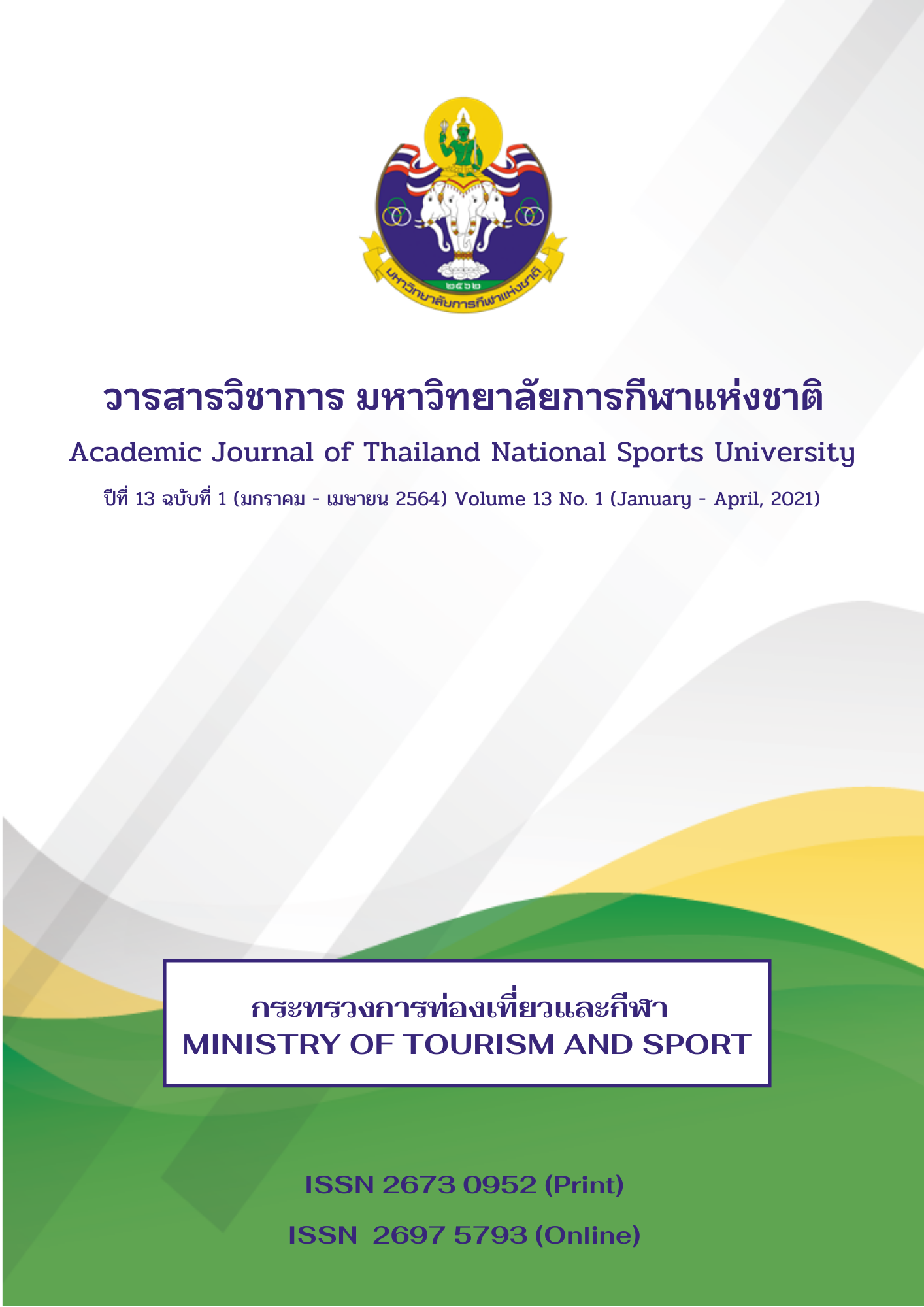SPORTS STRESS MANAGEMENT SKILLS OF THE PARTICIPANT ATHLETES AT THE 44TH THAILAND NATIONAL SPORTS UNIVERSITY GAMES
Main Article Content
Abstract
This study was a survey research and aimed to examine the differences and the relationship in sports stress management skills by gender, sport type, and duration of daily practice in the athletes of the 44th Thailand National Sports University Games. The samples were 384 athletes participating in the 44th Thailand National Sports University Games. The sample size (n = 384) employed the Krejcie & Morgan (1970) method and the Multiple Random Sampling by the proportion of sport type. The instrument used was the questionnaire on sports stress management. The validity and reliability of questionnaire were 0.6-1.0 and 0.98 respectively. Data were analyzed using descriptive statistics, Three-Way Analysis of Variance, and Multiple Regression Analysis at the significance level of 0.05.
The results showed that gender and sport types had no influence on sports stress management skills whereas the duration of daily practice had a significant influence on sports stress management skills (p<0.05). It was also found that sport types and duration of daily practice had a significant influence on sports stress management skills (p<0.05). Moreover, the gender, sport types, and duration of daily practice could explain the variation of scores by 3.0 percent, and in each respect of area, the gender and the sport types had no relationship with sports stress management skills overall whereas the duration of daily practice had a statistically significant relationship with sports stress management skills at p<0.05.
In conclusion, the amount of time you spend practicing in sports per day will be important and it’s the main factor for athletes to be able to manage their stress because practice will make athletes have self-confidence and will affect their ability to express in sports.
Article Details
The published article is a copyright of the Academic Journal of Thailand National Sports University. The passage appeared in each article in this academic journal is a perspective of each author which is not related to the journal. Each author is required to be responsible for all components of his/her own article. If there are any mistakes, each author must be responsible for those mistakes on his/her own.
References
Belem, I.C., et al. (2014). Impact of coping strategies on resilience of elite beach volleyball athletes. Revista Brasileira de Cineantropometria e Desempenho Humano, 16(4), 447-455.
Caruso, C. M., et al. (1990). Psychological and physiological change in competitive success and failure. Journal of Sport and Exercise Psychology, 12, 6-20.
Chatkamol Singnoi. (2011). Causal relationship of factors affecting power outage in the eastern youth athletes. Journal of Sports Science and Technology, 11(2), 288-305.
Department of Physical Education. (2013). Sports psychology. Bangkok: War Veterans Organization.
Department of Physical Education. (2017). Psychological characteristics of Thai youth athletes: The coping skills. Bangkok: Sun Packaging.
Du Plessis E.S. (2014). Sport psychological skills profile of 14- year old and 15-year old sport participants in Tlokwe Municipality: The PAHL-Study (Master’s thesis), North-West University.
Gould, D. & Dieffenbach K. (2002). Psychological characteristics and their development in Olympic champions. Journal of Applied Sport Psychology, 14, 172–204.
Johns, J. (2011). Mental toughness and coping skills in competitive runners and triathletes. Retrieved from http://www. Coolrunning.com.au/forums/index.php?app=ccs&module =pages§ion=pages&id
Kajbafnezhad, H., et al. (2011). Difference between team and individual sports with respect to psychological skills, overall emotional intelligence and athletic success motivation in Shirazcity athletes. Journal of Basic and Applied Scientific Research, 1(11), 1904-1909.
Khodayaria B., Saiiari A., and Dehghan M.R. (2011). Comparison relation between mental skills with sport anxiety in sprint and endurance runners. Procedia - Social and Behavioral Sciences, 30, 2280–2284.
Krejcie, R. V. & Morgan, D. W. (1970). Determining sample size for research activities. Educational and Psychological Measurement, 30(3), 607-610.
Omar-Fauzee M.S., et al. (2008). The relationship between the task and ego orientations and coping strategies among universities athletes. Journal of Research, 3(2), 107–111.
Polatidou, G., Sofia B., & Panagiotis A. (2013). Psychological skills evaluation of greek swimmers with physical disabilities. Indian Journal of Applied research, 3(12), 483-487.
Smith, R. E., et al. (1995).Development and validation of a multidimensional measure of sport-specific psychological skills: The athletic coping skills inventory-28. Journal of Sport and Exercise Psychology, 17, 379-398.
Supatcharin Khemarat. (2014). Developing and checking the structural validity of Questionnaire for skills sports stress management - 28 Thai version. Bangkok: Department of Physical Education.
Suthep Meithaisong, et al. (2011).The development of causal models for managing sports excellence of sports school students. The 12th Khon Kaen University 2011 Graduate Research Conference.
Tourism and Sports. (2019). National Sports University Act. Retrieved from https://www.mots.go.th/download/PolicyStrategy/60June12sport(new).pdf


